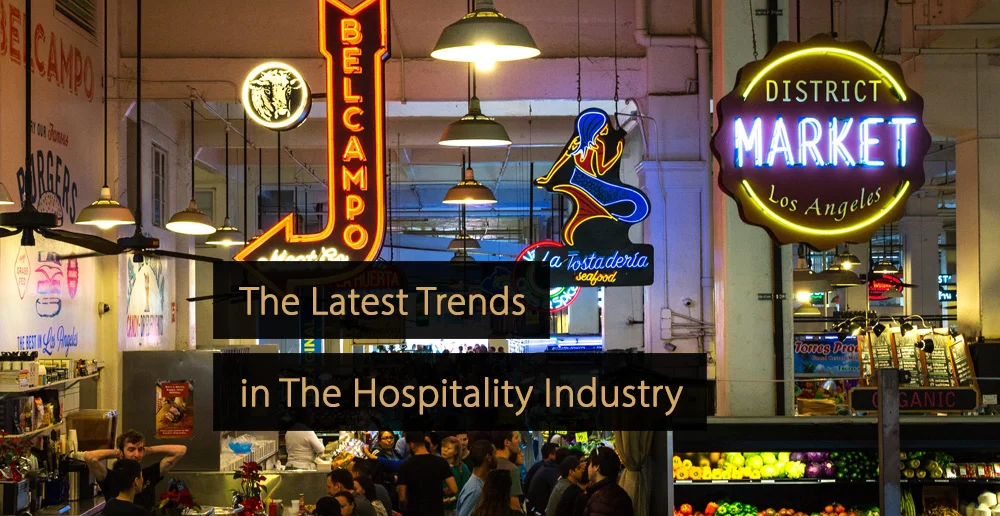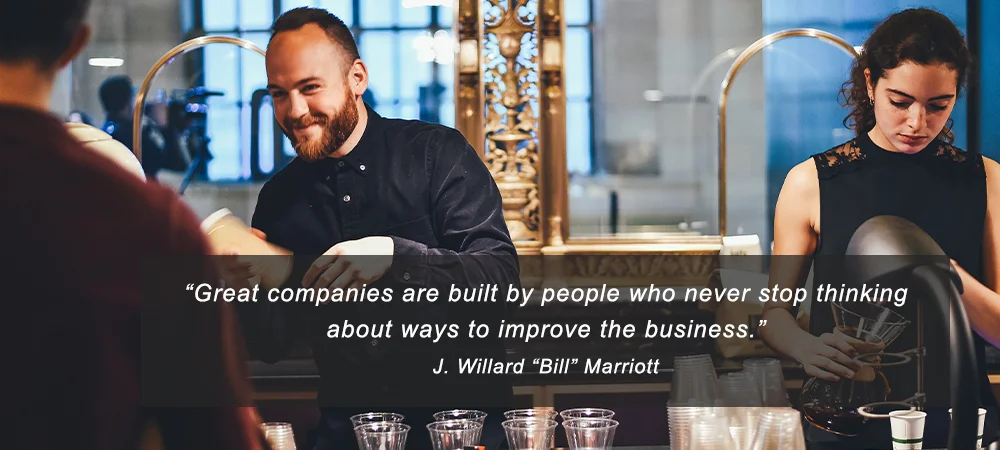The hospitality industry is competitive, and businesses must keep up with the latest hospitality trends to avoid being left behind. Additionally, keeping pace with the industry is a great way to ensure your business delivers the customer experience people want and expect. In this article, you will learn about all the hospitality trends 2025.
Table of Contents:
- Why is it Important to Keep up With the Latest Hospitality Trends?
- Factors Responsible for Upcoming Hospitality Developments
- 28 Hospitality Trends in 2025 Hoteliers Should Know About
- 1. Renewable Energy
- 2. Sustainability
- 3. Wellness
- 4. Preventative & Holistic Spas
- 5. Safety & Hygiene
- 6. Artificial Intelligence
- 7. Chatbots
- 8. Hospitality Using ChatGPT
- 9. Contactless Payments
- 10. Automation Options
- 11. Bleisure Travel
- 12. Changing Guest Expectations
- 13. Workations
- 14. Voice Search & Voice Control
- 15. Robots in Hotel & Restaurant Settings
- 16. Virtual Reality Tours
- 17. Mobile Check-In Service
- 18. Experiential Travel
- 19. Healthy and Organic Food & Drinks
- 20. Personalization
- 21. Smart Hotels
- 22. Augmented Reality
- 23. Digital & Mobile
- 24. The Metaverse Opens a New Door to the Hospitality Industry
- 25. Remote Work
- 26. Brand Loyalty Programs
- 27. Fixing Staff Shortages
- 28. Using Social Media
- What Are the Biggest Hospitality Trends Related to Marketing?
- What Are the Biggest Hospitality Trends Related to Technology?
- Learn About Hospitality Trends Through Hospitality Courses
Why Is It Important to Keep up With the Latest Hospitality Trends?
The most successful hospitality companies are constantly evolving, but if you are going to achieve this, you must keep up with the latest hospitality trends. This includes marketing efforts and hospitality processes to embrace the latest technology and respond to global events.
With marketing, keeping up with the latest trends will give you the best possible chance of reaching your target audience and conveying what you want to convey. Meanwhile, embracing new technology can help make a business more efficient, while in other cases, it can improve the overall customer experience.
On the other hand, a failure to keep up with the latest hospitality trends can have serious negative consequences, such as providing rival companies with a clear competitive advantage over you. Worse still, it can lead to your business failing to deliver the kind of experience customers might have come to expect.
Factors Responsible for Upcoming Hospitality Developments
The term ‘trend’ describes a shift in behavior or a more generalized situation change. With this in mind, hospitality trends may include changes in how customers behave, new ways of providing hospitality services, or general moves towards adopting new hospitality technology. A range of different factors typically influences trends.
For instance, the rise of technology like artificial intelligence has led to a trend where machine learning is used more regularly, and AI technology is deployed more frequently for customer service purposes. Meanwhile, virtual reality technology’s emergence has altered how many hospitality companies promote their products.
Often, wider global events can influence hospitality trends too. A good example of this can be seen with the COVID-19 pandemic, which forced hospitality businesses to focus more on hygiene, cleanliness, safety, and local markets. Similarly, climate change concerns have caused companies to focus on eco-friendly solutions.
Table: Factors Influencing Hospitality Trends
28 Hospitality Trends Hoteliers Should Know About
The diverse hospitality industry includes everything from hotels and other accommodation types to restaurants, bars, travel agents, and tour operators. Adopting the latest hospitality trends in response to the changed behavior of customers due to the coronavirus pandemic is essential. Still, most trends emerged out of more general changes in consumer behavior.
1. Renewable Energy
Today’s travelers and diners are increasingly interested in ensuring their leisure doesn’t come with a heavy environmental price tag. At the same time, businesses in the hospitality sector are seeing the benefits of reducing energy consumption and switching to renewables where possible.
Along with the reduction of waste, cutting down on energy consumption and embracing green energy can help hospitality businesses to become more efficient and attract environmentally conscious consumers. Hotels can utilize five renewable energy sources: solar, wind, combined heating and power, geothermal, and biofuels. Funding and space constraints pose challenges, but the hospitality industry acknowledges the environmental responsibility and cost-saving potential amid energy market fluctuations.
Video: Hotel Invests in Renewable Energy
2. Sustainability
Customers are very concerned with environmental issues and want to know that the businesses they deal with are behaving ethically. For this reason, sustainability has been one of the most noticeable hospitality trends of recent times, with many hospitality businesses promoting their eco-friendliness. According to the Sustainable Travel Report by Booking.com, 76% of travelers want to travel more sustainably.
Examples of this range from restaurants promoting their vegetarian and vegan options to hotels that use smart light bulbs and smart heating to save energy. Within the accommodation sector, there are also decisions to be made about using more sustainable materials for things like towels and bedsheets.
Video: A vision for sustainable restaurants
3. Wellness
Wellness is one of the significant hospitality trends today. People are increasingly health-conscious and enthusiastic about preventative medicine and other forms of self-care and increasingly keen to combine these with leisure and travel. Traditional wellness spas are as popular as ever, while partnerships with experts and treatment centers allow hospitality businesses to offer unique packages.
Embracing nature to reduce stress and boost well-being is well-established. In the spas of the future, architects should prioritize incorporating natural elements and a variety of air circulation systems, from open spaces to advanced artificial environments. This trend is helping to drive the market, something that everyone in the hospitality industry should know about.
Video: Spa and Wellness
4. Preventative & Holistic Spas
Preventative medicine and self-care are prevailing trends, propelling the wellness industry further into a trillion-dollar market. Hospitality venues, particularly those with existing spa facilities, are primed to seize a significant share of this growing market. Beyond traditional beauty and relaxation services, there’s a surging demand for health diagnostics and personalized treatment plans.
Experts, whether individually or in group sessions, are sought to guide clients toward vitality, stress management, emotional balance, mindfulness, and improved sleep. This shift reflects the evolving focus of spas, catering to holistic well-being in response to the burgeoning interest in self-care and overall health.
Video: Holistic Healing
5. Safety & Hygiene
Several hospitality trends can be broadly described as being related to safety and hygiene. These have become especially important after the COVID-19. These concepts must be a priority for hotels, restaurants, bars, and cafes. Any special rules need to be made clear ahead of time and enforced to make people feel safe.
Moreover, your hospitality marketing efforts also need to emphasize the safety and hygiene steps you are taking. Explaining these steps could be the difference between generating bookings and having customers look elsewhere. In the article “Hygiene is the New Marketing Message for Hotels” you find tips to highlight safety in your marketing & guest communication messages.
6. Artificial Intelligence
Artificial intelligence plays several roles within the hospitality industry, but the main one is improving customer service. One example is AI-powered chatbots, which can be used for online customer interactions, removing lengthy waiting times and providing swift, intelligent responses to questions. According to the AI In Hospitality Market by We Market Research, the global AI in hospitality market is projected to grow at a CAGR of 60% until 2033.
However, there are additional uses for artificial intelligence technology too. For instance, some hotels have introduced AI and voice-controlled customer service or tourist information hubs within their hotels. Meanwhile, AI can also sort through data, automatically adjust processes, etc.
Video: Restaurant Table Booking Chatbot
Video: Hotel Chatbot
Find more detailed information and examples of artificial intelligence use cases in the hospitality industry in the article “How to use Artificial Intelligence in the Hospitality Industry.”
7. Chatbots
Chatbots are another of the major hospitality trends linked with customer service and can be especially useful for delivering swift responses to questions, even when human staff is unavailable. In many cases, this can lead to first-contact resolutions, but the chatbot can also gather information and pass it on to a human rep if required.
Those in the hospitality industry need to get to grips with the increased number of questions customers will have about coronavirus and restrictions within accommodations and restaurants too. Chatbots will be able to answer the most fundamental questions in this area within seconds, helping to reduce stress levels for all involved.
Read “Reasons Why Every Hotel Needs a Hotel Chatbot” to learn much more.
8. Hospitality Using ChatGPT
ChatGPT has taken the world of hospitality by storm, powering some of the most intriguing hospitality trends. These include custom-made chatbots for hotels, restaurants, and other businesses, allowing them to offer multilingual customer service around the clock.
ChatGPT can analyze data to develop more effective marketing campaigns, make predictions, and create personalized experiences that make guests feel valued. To discover some of the applications of ChatGPT for the industry, read “ChatGPT Hospitality Guide: How ChatGPT Can Help the Hospitality Industry.” You’ll learn how ChatGPT can improve efficiency, reduce costs, and improve customer service.
| Use Case |
Description | Benefits |
|---|---|---|
| Customer Support Chatbots | Implementing chatbots for instant customer assistance. Answering frequently asked questions and handling routine queries. |
24/7 availability, improving customer service responsiveness. Reducing staff workload and enhancing efficiency. |
| Reservation and Booking Assistance | ChatGPT-powered bots assisting guests in the booking process. Providing information on room availability, rates, and amenities. |
Streamlining reservation procedures for a seamless experience. Increasing booking conversion rates and revenue. |
| Language Translation Services | Implementing chatbots for real-time language translation. Overcoming language barriers for a more inclusive and welcoming experience. |
Improving communication with international guests. Expanding the reach to a diverse global audience. |
9. Contactless Payments
Many of the biggest hospitality trends are concerned with reducing friction, and contactless payments have been one of the most prominent examples. Customers save time sorting through cash or entering their PIN when accepting contactless payments. The emergence of things like Apple Pay and Google Pay also removes the need to carry a wallet.
Aside from removing friction and improving the customer experience, the coronavirus pandemic has also increased the demand for contactless payments. Many customers and staff members feel uncomfortable handling cash, and providing the option for contactless payments may be seen by many as a necessity rather than a luxury.
Video: Contactless Payments
Below you will find a video that shows how contactless payments work.
Read “Contactless Payments Are Becoming More Important Within Hospitality” for more information.
10. Automation Options
Automation options are tools that allow important processes to be carried out automatically, with minimal or no human involvement. In hospitality, it often reduces the need for human-to-human interactions.
Automation tools are valuable because they can improve efficiency and reduce demands on employees. In some cases, automation can also deliver superior accuracy or performance by eliminating human error.
Examples of automation options within the hospitality industry include the aforementioned chatbots and AI tools, along with automated check-in and check-out processes, automated billing and automated temperature controls. Software can also provide relevant tools, including automated revenue management, distribution and marketing activities.
Data analytics is increasingly reliant on automation due to the vast quantities of data being analyzed. By embracing automation-related hospitality trends, businesses can enhance the guest experience and boost behind-the-scenes operations.
11. Bleisure Travel
Bleisure travel is the combination of business and leisure. It differs from workations because this business travel is usually paid for by the employer and often focused on meetings and events, rather than day-to-day work activities.
Growth of the bleisure segment is one of the most significant hospitality trends and has become a key area for businesses to focus on. Bleisure travelers are usually relatively short-stay guests, but are often high spenders.
For the most part, bleisure travelers will prioritize the business travel element and their trips are often arranged for them. However, they will try to enjoy leisure activities in their free time. Bleisure travelers also provide hospitality businesses with a unique opportunity to attract repeat custom from the same guest.
In the “What is Bleisure Travel? What Are Bleisure Travelers Looking For?” article, you can dive into the concept of bleisure travel further, learn about bleisure travelers and access tips for attracting these guests.
Video: What is Bleisure Travel?
12. Changing Guest Expectations
Guest expectations are continually evolving, influenced by technology, wider customer service trends and competitors’ offerings. Hospitality businesses need to stay up-to-date with their understanding of these expectations.
By adapting your offering to changes in guest expectations, you can demonstrate your awareness and versatility. Failing to respond to changing expectations can cause you reputational harm and reduce the number of bookings you attract.
Examples of some of the specific hospitality trends that are influencing guest expectations right now include demand for more digital touchpoints and a greater emphasis on unique and personalized experiences. Social media platforms like Instagram have also had an influence on expectations around the presentation of food in restaurants.
Today’s guests expect mobile-optimized websites, a mobile app and options like QR code scanning to access online resources quickly. Customers are also increasingly willing to provide personal data in exchange for better service.
13. Workations
A workation combines work and vacation activities into a single trip. It has emerged as one of the key hospitality trends as the concepts of digital nomads and remote working have become mainstream.
Workation guests are an important target audience for hospitality businesses because they use a combination of services. As they will be working while on-site, they require fast internet and other relevant amenities.
The precise balance of work and leisure for a workation can vary significantly, but these guests will often spend weekdays working remotely from a laptop, while spare time is spent doing tourist activities or relaxing. In a hotel, for example, they may need to use a combination of corporate and leisure facilities in the same day.
Some of these guests are self-employed and able to stay for several weeks or even months, while carrying out their work activities. For hospitality businesses, the rise of the workation has also opened up the possibility of attracting more guests at all times of the year, including during the traditional off-season months.
Video: What Are Workations? A Beginner’s Guide to Combining Work and Travel
14. Voice Search & Voice Control
The use of voice search is becoming increasingly common among customers searching for and booking hotels and restaurants. Hence, you need to respond to this change in behavior and make a clear attempt to capture these customers. This means, among other things, structuring your website content clearly, so it features properly in voice search results.
Beyond this, voice control can also control devices within hotel rooms, enhancing the guest experience. For example, smart speakers can provide guests with answers to questions and respond to voice requests to turn on lights and devices within the room. This can also reduce the number of surfaces guests touch.
Video: Hotel Search on Smartphone with Voice
Check out “How Can Voice Control Benefit the Hospitality Industry?” for further details.
15. Robots in Hotel & Restaurant Settings
Automation ranks high on the list of hospitality trends to be aware of, and robotics is a good example of this being taken further. Hotels, restaurants, and similar businesses can use robots to greet customers and provide customer information, while they can also play a vital role in security operations.
Within the hotel setting, robots have been used to offer room service and perform cleaning and other housekeeping chores. Meanwhile, restaurants can potentially use robots to carry out aspects of food service. This can be especially useful when dealing with restaurant customers trying to reduce close contact with people as much as possible.
Video: Example Robots Helping Out in Restaurant
Video: Alibaba’s ‘Future Hotel’ Uses Robots
Look at “Hotel Robots: An Overview of Different Robots Used in Hotels” and “Examples of Robots Being Used in the Hospitality Industry” for further reading.
16. Virtual Reality Tours
Virtual reality ranks among the most exciting hospitality technology trends, providing the means for potential hotel guests or restaurant diners to experience their surroundings, all from the comfort of their own homes. This can be crucial for moving these people from the planning stage to committing to a visit.
Virtual tours/ 360 videos can help some customers to better understand the facilities available. Offering this service also gives you a clear edge over any rivals that are not yet capitalizing on this particular hospitality trend, and the web-based nature of modern VR tours means they should be easily accessible on many devices, even without a VR headset.
Video: 360 Virtual Tour for Holiday Inn Express Adelaide
Video: The West Restaurant 360 VR Tour
Find more detailed information and examples about how virtual reality can benefit your business in the article “How Virtual Reality (VR) Can Enrich the Hospitality Industry” if you would like to know more.
17. Mobile Check-In Service
Primarily associated with hotels and other forms of accommodation, offering a mobile check-in service is one of the most useful hospitality trends for reducing the need for human-to-human contact. This was an especially important concept within the context of the COVID-19 pandemic.
With that being said, even in more normal times, mobile check-ins can allow customers to benefit from self-service and will make the arrivals part of the customer experience much faster. For this to succeed, you must provide customers access to an app. Include a link on your website and provide QR codes on business literature.
Video: Mobile Check-In Service for Hotels
Our “Mobile Check-In App for Hotels: What Are The Benefits?” post further explores this hospitality industry trend.
18. Experiential Travel
Another trend that those in the hospitality industry are getting to grips with is the desire for tourists or travelers to enjoy local experiences. Many people do not simply want to experience a similar life but in a different location. Instead, they want to experience an authentic way of life in the location they visit.
Businesses in the hospitality industry are responding to this to cater to these demands. Hotels might provide local products, while other options like Airbnb and farmhouse accommodations can offer a more authentic guest experience. Moreover, travel agents and tour operators can help travelers participate in local activities.
Video: A Local Travel Guide of Amsterdam
Video: Food Travel Vlog about Local Food in Hong Kong
19. Healthy and Organic Food & Drinks
In the past, a substantial section of the hospitality industry comprised fast-food restaurants and bars selling sugary alcoholic drinks. However, there has been a cultural shift, with people becoming more aware of what they put in their bodies, leading to healthy food and drink trends.
For restaurants, this has meant re-vamping menus with healthier options, including gluten-free, dairy-free, low-fat, vegetarian, vegan, and organic options. However, the trend for healthy food and drinks extends to hotels, catering services, and even holidays, with healthier room service options and healthier drinks sold behind bars.
Video: Organic Holiday in Italy
20. Personalization
Across almost all industries, the need for personalization is a significant trend, and the hospitality industry is no different. The rise of big data primarily drives this. Meanwhile, many hotel guests want to be treated as individuals rather than anonymous customers.
Personalization can be deployed in a variety of ways. Within hotels, for instance, returning customers can be automatically provided with similar services to the last time they stayed. At the same time, they can also be personally greeted by a staff member upon arrival, using GPS technology and booking data. Furthermore, with the rise of smart devices, hotel guests can also use their own devices and accounts on entertainment platforms.

Peter Ricci, Clinical Professor and Director or Hosptality & Tourism Management Program at Florida Atlantic University (FAU)“Personalization is one of the key hospitality trends to focus on, but booking engines need to find the balance between this quest to deliver personalization with the need to provide a fast, user-friendly user experience. In general, it is best to prioritize making it as easy as possible to move from the interest phase to the booking phase. It is sensible to ask some key questions during the booking process itself, but it is also wise to keep these questions to a minimum. You can always follow up, requesting further information after a booking has been made. Booking speed is strongly connected to conversion rates, so you want to reduce friction as much as possible.” Click here to read more revenue management tips from our Hospitality Expert Panel. |
Video: Personalized Marketing by Nicole Martin
You can read more detailed information and examples of personalization marketing in the article “5 Ways Personalization Marketing Can Benefit the Hospitality Industry”.
21. Smart Hotels
In simple terms, a smart hotel is a hotel that uses internet-enabled devices that can send data to one another. Smart hotel designs are tied in with the ‘Internet of Things‘ idea and have emerged as a more popular concept since smart speakers and smart hubs became popular consumer products.
A smart hotel might, for example, allow guests to control the heating or air conditioning from their phone or turn on the TV by giving a voice command to a smart speaker. In many cases, smart rooms also automatically adjust things like the brightness of light bulbs or the temperature of a radiator to maintain optimal conditions.
Video: Example Smart Hotel
You can read more detailed information and examples about how smart hotel rooms can benefit your hotel in the articles “Smart Hotel Room; What Are the Benefits for Hotel Owners and Guests” and “7 Ways to Transform a Hotel Room Into a Smart Room”.
22. Augmented Reality
Finally, augmented reality technology is similar to virtual reality technology. Still, rather than creating a new digital environment for users, it enhances real-world environments through graphical or informational overlays. Unlike VR technology, it usually requires only a smartphone and an app.
Augmented reality apps can be designed so that users can point their phone at a restaurant and see reviews or opening times. Hotels and other accommodation types can also use augmented reality to provide interactive tourist information maps within their properties or to create fun opportunities to create user-generated content.
Video: Menu AR – a menu of restaurants in augmented reality
Video: Example Augmented Reality Within the Hotel Industry
Find more detailed information and examples about how augmented reality can benefit your business in the article “How Augmented Reality is Transforming the Hospitality Industry”.
23. Digital & Mobile
Digital marketing has been one of the most significant hospitality trends for many years now, but this digital focus needs to be targeted toward mobile devices more than ever before. Most people regularly use a smartphone to access the internet, and many hotel and restaurant bookings are mobile.
For hospitality companies, this means website content needs to be mobile-optimized. This could include moving away from longer-form content towards content that can be more easily displayed on and consumed via a smaller mobile screen. Booking engines must also be mobile-friendly, and mobile check-ins are growing in importance.
24. The Metaverse Opens a New Door to the Hospitality Industry
The metaverse is another of the emerging hospitality trends that those within the industry need to stay up-to-date on. Essentially, this refers to using technology like virtual reality and augmented reality, to create interactive virtual worlds. It can also coincide with the use of NFT (non-fungible token) technology.
You can find out much more about what the metaverse is, how it works, its relevance within the hospitality industry, and its connection with NFTs in the “Metaverse Opportunities for the Hospitality Industry” article.
25. Remote Work
In recent times, the number of people who are able to work remotely has increased dramatically and catering for these people has emerged as one of the most important hospitality trends. Whether it is people working from their local coffee shop or people working during a business trip, hospitality businesses need to understand this growing demographic and provide them with relevant services, such as reliable Wi-Fi, fast internet speeds, and comfortable places to work.
The rise of remote work has also led to the growth of co-working spaces, where people can access a workstation, collaborate with other remote workers, share ideas, and access refreshments and other relevant services.
26. Brand Loyalty Programs
Brand loyalty programs are designed to offer rewards to customers who return frequently and are one of the most crucial hospitality trends for companies to get to grips with if repeat business is a priority. Loyalty programs can be offered by hotels, based on stays, food and beverage businesses, based on orders, and by other hospitality brands too.
The rewards provided through loyalty programs can range from discounts, to free items, automatic upgrades, or access to members-only facilities. The key is to provide incentives for customers to return time and time again. As an added benefit, loyalty programs allow businesses to gain valuable data on customers and their preferences.
27. Fixing Staff Shortages
Staff shortages have emerged as one of the biggest hospitality trends of recent times. Hotels, restaurants, bars, cafés and other sections of hospitality are striving to find ways to address skills and personnel shortages.
Resolving these issues is vital because remaining staff are often being stretched too thin in terms of their workload. The result is a reduction in service quality and a poorer guest experience, which can then harm your reputation.
Some of the problems connected with staff shortages can be resolved by making a more compelling pitch to prospective job applicants and providing opportunities for career progression. Staff turnover can potentially be reduced if your workforce gets a sense that their hard work will be rewarded.
Flexible work schedules and training opportunities can further boost employee retention and make your business more appealing to new applicants. However, hospitality businesses should also explore other potential options, such as the use of artificial intelligence and machine learning, or the implementation of more dynamic work models.
28. Using Social Media
Social media platforms play a crucial role in modern hospitality. It is almost essential to have a presence on platforms like Facebook, X, Instagram and TikTok, while LinkedIn is important for recruitment and networking.
Having social media accounts helps guests to discover your hospitality business, ask questions, post about their experiences and access your content. Social media can also directly influence hospitality trends.
Platforms that prioritize visual content, like Instagram and TikTok, have increased the importance of creating the right aesthetic through your interior and exterior design. Meanwhile, Facebook has become a major platform for customer service. It may also be worth exploring emerging platforms this year, like Bluesky.
The platforms you use may also depend on your target audience. For instance, if you are targeting Gen Z guests, behind-the-scenes content on TikTok, YouTube or Twitch may be more valuable than posts on Facebook. If you want to reach a wide and varied audience, Facebook, Instagram and X have huge user bases and a range of age demographics.
What Are the Biggest Hospitality Trends Related to Marketing?
Regarding hospitality trends related to marketing, there are several general trends to be aware of. These include the increased focus on local and voice search, increased use of virtual reality tours to sell hospitality products, a greater emphasis on personalization, and the growth of influencer marketing.
Read “Hospitality Marketing Trends: Discover The Latest General & COVID Related Trends” to explore these hospitality trends in depth and learn more about hospitality marketing as an overall concept.
What Are the Biggest Hospitality Trends Related to Technology?
Many of the most crucial hospitality trends to keep pace with are related to the use of technology. In particular, some of the most significant trends in this area include the ever-growing use of voice control, the rise of contactless and mobile payment methods, the use of robotics, and the continued improvement of artificial intelligence.
Hospitality leaders who fail to stay up-to-date with the latest technology trends risk giving their competitors a head start when delivering a great customer experience. To learn more about hospitality trends linked to technology, check out our “The Latest Technology Trends in the Hospitality Industry” article.
Learn About Hospitality Trends Through Hospitality Courses
One of the best ways to learn all about important hospitality trends while also improving your career prospects is to take a hospitality course. These courses may be generalized or may focus on a particular area of the hospitality industry, and there are options for management, marketing, and various other career paths too.
Read “Hospitality Course: An Overview of Courses & Hospitality Educators” for a more detailed look at the options available here, along with the benefits. At the same time, you will also be able to access a list of websites for exploring hospitality courses and a list of educators who provide these courses.
An Overview of Channels for Finding Hospitality Jobs
One of the key hospitality trends related to job seeking has been the growth of job search websites focused squarely on the hospitality industry. This includes hospitality job boards and hospitality recruitment agencies. Of course, it is also possible to find jobs by visiting employers’ websites or through social media sites.
Read the “Hospitality Jobs: Overview of All Channels to Find Your Next Job” article for a closer look at the various channels available for job searches, alongside a list of some of the best websites to try.
Hospitality Trends FAQs
Those in the industry need to keep up with the latest hospitality trends to not fall behind competitors. While the hospitality industry itself is diverse, the ten trends cited in this article apply to many different aspects and can help improve the customer experience.
Want to Learn More About Trends in Related Industries?
It is essential to be aware of all the upcoming trends in the hospitality & tourism-related industries. While some trends can affect multiple industries, some are specific to the industry. You can learn more about trends within different industries in the following articles.
- Revenue Management Trends: Discover the Latest Developments
- Hotel Trends: Discover The Latest Developments in The Hotel Industry!
- Travel Trends: Opportunities for the Travel Industry
- Tourism Trends: The Latest Opportunities for The Tourism Industry
More Tips to Grow Your Business
Revfine.com is the leading knowledge platform for the hospitality and travel industry. Professionals use our insights, strategies, and actionable tips to get inspired, optimize revenue, innovate processes, and improve customer experience.Explore expert advice on management, marketing, revenue management, operations, software, and technology in our dedicated Hotel, Hospitality, and Travel & Tourism categories.
This article is written by:
Hi, I am Martijn Barten, founder of Revfine.com. With 20 years of experience in the hospitality industry, I specialize in optimizing revenue by combining revenue management with marketing strategies. I have successfully developed, implemented, and managed revenue management and marketing strategies for individual properties and multi-property portfolios.









Thank you for sharing this information!
Nice blog, you provide some important information.
Wow, thanks a lot for the wonderful information. You really open up my mind. I can use the information for my career.
Blessings. Charles, a masters student from OUT Tanzania pursuing MTPM programme.
Hi Charles, I’m a MBA student too, maybe we can work together :)
The hospitality industry can be defined and understood as an industry which provides facility for stay, food and complete related services for the comfort and leisure of the travelers and visitors.
Hospitality is the industry covering all the products and services that serve travelers, tourists and all types of visitors. When you know tourism you also understand the hospitality industry. The COVID-19 pandemic has acted as a catalyst to rapid change and innovation across the hospitality industry. The biggest trends coming for the hospitality industry are sustainability, global perspective, finding balance with new lodging options, and growing demand. Not a day goes by that we hear information on coronavirus and its negative impact on travel and hospitality businesses. Yet, the hotel industry had to deal with different crises and viruses earlier. Hospitality trends can help to improve the industry to be more advanced and much easier to assess.
Amazing write-up! With the economy gradually reopening, the hospitality industry is also picking up its pace. With the vaccine roll-outs garnering momentum, 2021 appears promising.
Thanks for the information!
Thank you for this wonderful information!
Amazing article! Safety and hygiene trump all trends now. Hygiene marketing has become crucial to promoting your business. Communicating hygiene measures on the homepage is a great idea, as this tells potential guests how serious you are about their safety.
It’s amazing to know that augmented reality apps can be designed for Hotels and other accommodation types. It is a good idea to use augmented reality to provide interactive tourist information maps and to create user-generated content.
Very Interesting, thank you for sharing these trends.